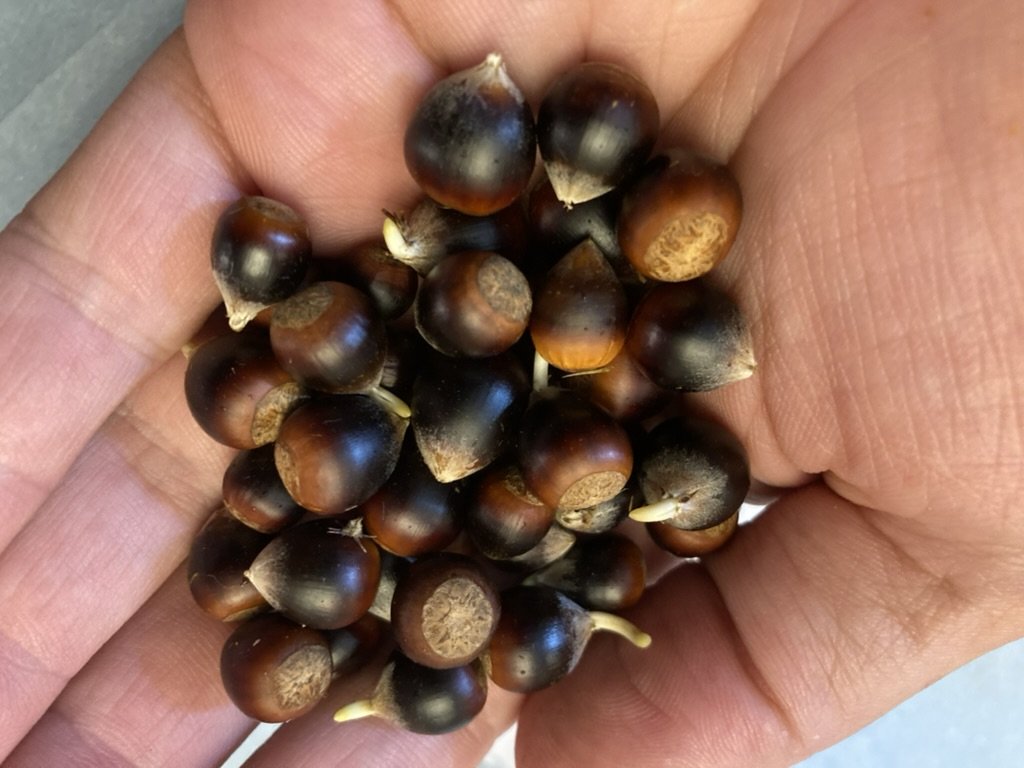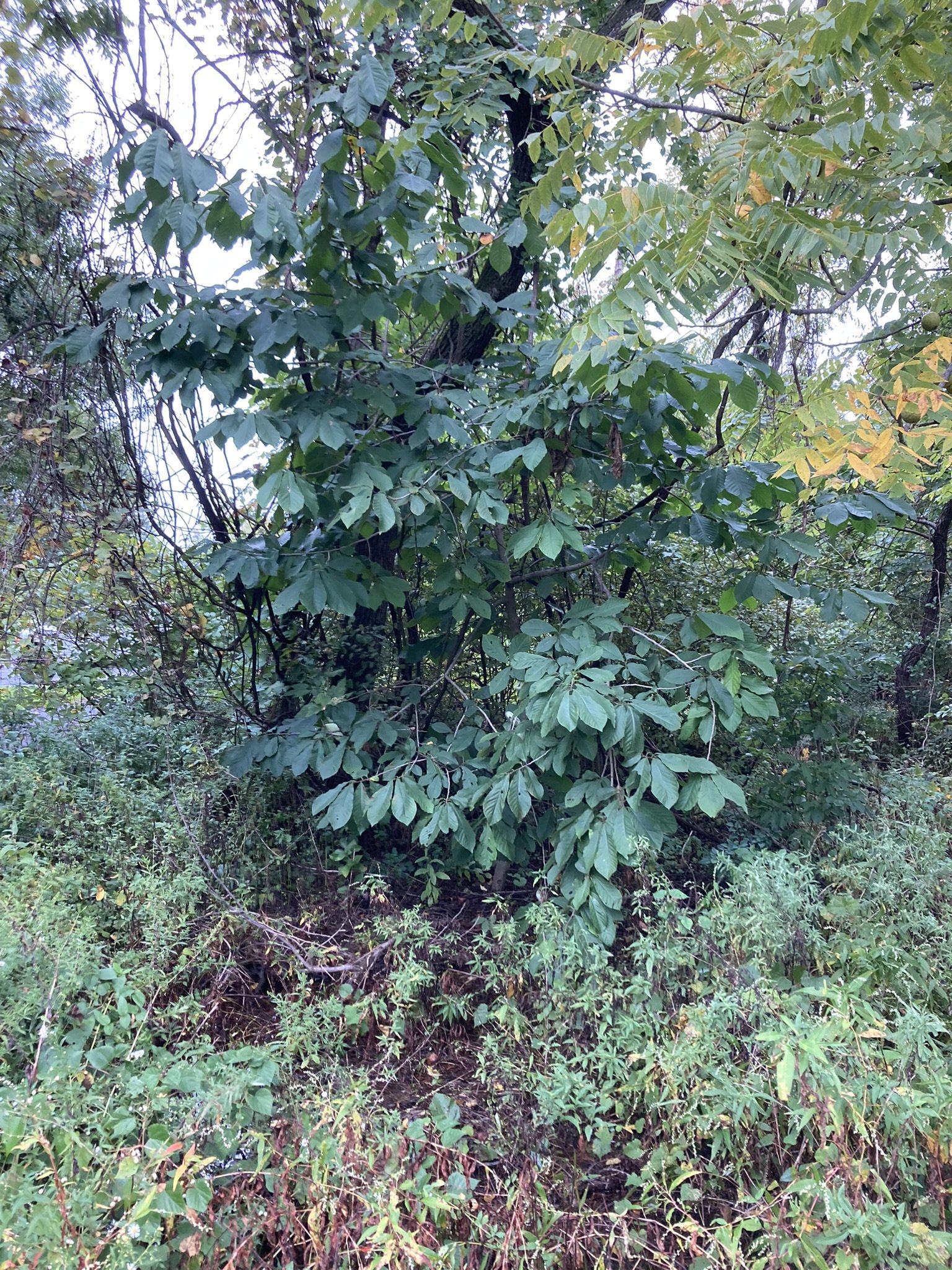 Image 1 of 2
Image 1 of 2

 Image 2 of 2
Image 2 of 2



Allegheny Chinquapin
🌰 Castanea pumila (Allegheny Chinquapin)
Small Tree or Large Shrub | Eastern U.S. Native | Edible Nuts | Pollinator-Friendly & Wildlife-Favored
Highlights for Native Plant Enthusiasts:
🐛 Host plant for several native moths and butterflies, including the Luna Moth and Banded Hairstreak
🐿 Produces small, sweet nuts—devoured by squirrels, chipmunks, turkeys, and other forest wildlife
🐝 Fragrant, creamy catkins attract native bees and wasps in high numbers during summer bloom
🌿 Naturally found in dry woods, pine barrens, sandy hillsides, and open oak forests
🌳 Ideal for edible native gardens, savanna restorations, and wildlife-focused plantings
🌱 Grows as a multi-stemmed shrub or small tree—great for edge plantings, thickets, or understory diversity
Growing Information:
Height: 6–25 ft | Spread: 6–15 ft
Soil: Well-drained, acidic sandy or loamy soils; thrives in nutrient-poor or dry conditions
Light: Full sun to light shade
Zones: 5–9
Type: Deciduous shrub/small tree
Notes: Self-fertile, but better nut production with cross-pollination
Why Native Growers Love It:
Castanea pumila is the lesser-known cousin of the American Chestnut, and it punches above its size in ecological value. Its nuts are not just edible—they’re sweet, nutritious, and an important wildlife food source. The plant flowers in mid-summer, offering an abundant nectar resource during a seasonal gap when many native flowers have faded.
Resilient, drought-tolerant, and adaptable to fire-managed landscapes, Allegheny Chinquapin thrives in open woods, woodland edges, and dry slopes, where it helps stabilize soil, support insects, and feed forest creatures. It’s also prized by foragers and permaculture enthusiasts for its dual-purpose: food and habitat.
The Allegheny Chinquapin is listed as "critically endangered" in New Jersey, and "vulnerable" in Delaware.
Seed source is a captured mix of open pollinated genetics from across their native range, gown in Ohio, with the primary origins in northern VA.
🛒 Plant Castanea pumila—nourish wildlife, support pollinators, and grow a living legacy of native abundance.
🌰 Castanea pumila (Allegheny Chinquapin)
Small Tree or Large Shrub | Eastern U.S. Native | Edible Nuts | Pollinator-Friendly & Wildlife-Favored
Highlights for Native Plant Enthusiasts:
🐛 Host plant for several native moths and butterflies, including the Luna Moth and Banded Hairstreak
🐿 Produces small, sweet nuts—devoured by squirrels, chipmunks, turkeys, and other forest wildlife
🐝 Fragrant, creamy catkins attract native bees and wasps in high numbers during summer bloom
🌿 Naturally found in dry woods, pine barrens, sandy hillsides, and open oak forests
🌳 Ideal for edible native gardens, savanna restorations, and wildlife-focused plantings
🌱 Grows as a multi-stemmed shrub or small tree—great for edge plantings, thickets, or understory diversity
Growing Information:
Height: 6–25 ft | Spread: 6–15 ft
Soil: Well-drained, acidic sandy or loamy soils; thrives in nutrient-poor or dry conditions
Light: Full sun to light shade
Zones: 5–9
Type: Deciduous shrub/small tree
Notes: Self-fertile, but better nut production with cross-pollination
Why Native Growers Love It:
Castanea pumila is the lesser-known cousin of the American Chestnut, and it punches above its size in ecological value. Its nuts are not just edible—they’re sweet, nutritious, and an important wildlife food source. The plant flowers in mid-summer, offering an abundant nectar resource during a seasonal gap when many native flowers have faded.
Resilient, drought-tolerant, and adaptable to fire-managed landscapes, Allegheny Chinquapin thrives in open woods, woodland edges, and dry slopes, where it helps stabilize soil, support insects, and feed forest creatures. It’s also prized by foragers and permaculture enthusiasts for its dual-purpose: food and habitat.
The Allegheny Chinquapin is listed as "critically endangered" in New Jersey, and "vulnerable" in Delaware.
Seed source is a captured mix of open pollinated genetics from across their native range, gown in Ohio, with the primary origins in northern VA.
🛒 Plant Castanea pumila—nourish wildlife, support pollinators, and grow a living legacy of native abundance.































